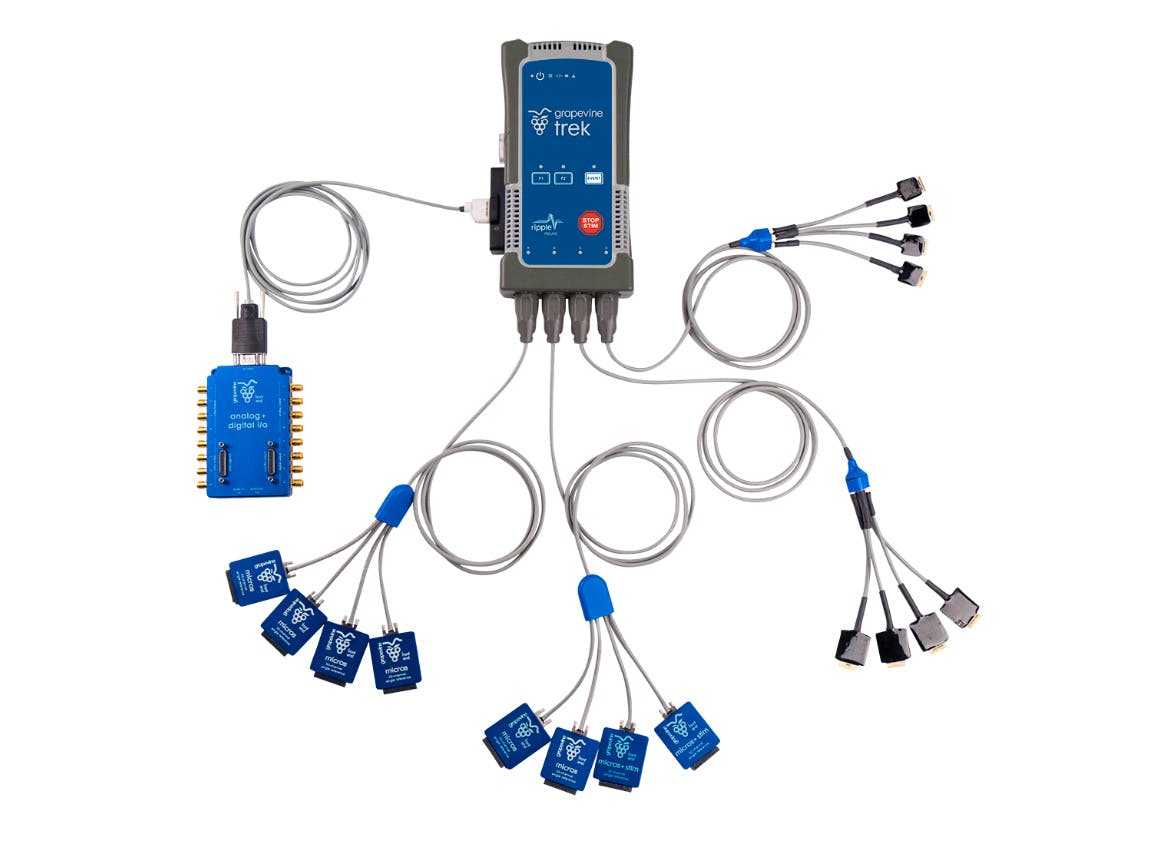Technology
IRIS has designed its core technology platform from the ground up to offer a range of components and complete-system platforms.
Component
Integrated Circuits
IRIS Biomedical specializes in high-fidelity neural sensing. Unlike other design firms in the implantable device market, IRIS has a long history of developing solutions for sensing applications. Our sensing ASIC and extensive portfolio of low-power, low-noise electronic designs reflect the cumulative output of over 15 years of effort delivering advanced tools to enable basic-science and translational neural interface research.
IRIS offers neural sensing components for inclusion into larger designs. IRIS also offers complete system-level design and testing services.
32-Channel Recording ASIC (Available Now)
The cornerstone of IRIS Biomedical’s expertise and capabilities in neural sensing is our 32-Channel sensing ASIC, designed for high-resolution, low-noise acquisition of a variety of biopotential signals. Compatible with a wide range of electrodes shapes and sizes, IRIS’s ASIC technology enables miniaturized, low-power solutions for applications ranging from individual action potential sensing, to ECAP and EEG monitoring.
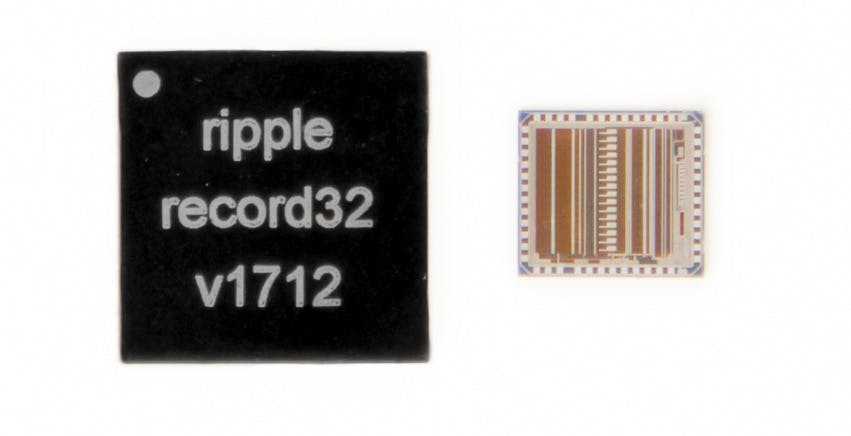
IRIS Biomedical’s stimulation technologies and stimulation circuit design expertise are the result of over a decade of continuous effort, and multiple generations of product development to create high-performance tools for advanced neural interface applications.
Our stimulation hardware and waveform control engine (including ASIC and control logic) differ significantly from technologies presently available in the clinical neuromodulation market. All of IRIS’s stimulation ASICs provide independent current control (ICC) on every channel. Additionally, waveforms and train patterns on each channel can be programmed at an “atomic” level through very high temporal-resolution control of each channel’s output. This allows the ASIC to be programmed to output any desired waveform and any desired frequency (from DC up to multi-kHz).
Channel output flexibility allows for programming of an exhaustive variety of multi-polar sink and source configurations.
The output accuracy of our stimulation ASICs and circuit designs have been thoroughly verified through extensive bench-top testing. At the system level, our stimulation capabilities have been field-tested in hundreds of basic-science and translational research labs and hospitals around the world, and used in a variety of human investigational studies for neuromodulation and neuroprosthetic applications.
IRIS Biomedical currently offers two stimulation ASICs for external and implanted clinical neuromodulation applications.
16-Channel Stim + Sense ASIC (Currently Available)
Our second-generation neural sensing and stimulation ASIC is ideally suited for non-implanted, closed-loop neural interface and neuromodulation applications. Integration of stimulation and sensing into a single ASIC allows for simplified circuit design and smaller overall system footprint.
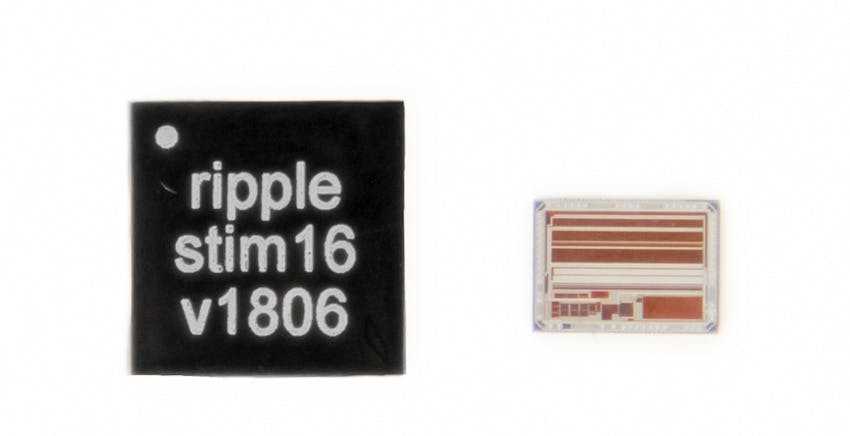
8-Channel High-Current ASIC
Our fourth-generation stimulation ASIC, currently in production at the foundry, is designed specifically for active implantables that require highly-complex, time-varying stimulation patterns on multiple independent channels with the ability to integrate an external neural sensing chip.
This stimulation ASIC supports real-time, external control of arbitrary current waveforms across every channel, and stimulation trains at up to 30 kHz. Each channel can deliver currents from 1μA up to 15mA with a compliance voltage of 15V. This stimulation ASIC can be combined with our sensing ASIC to achieve high-performance simultaneous sensing and stimulation.
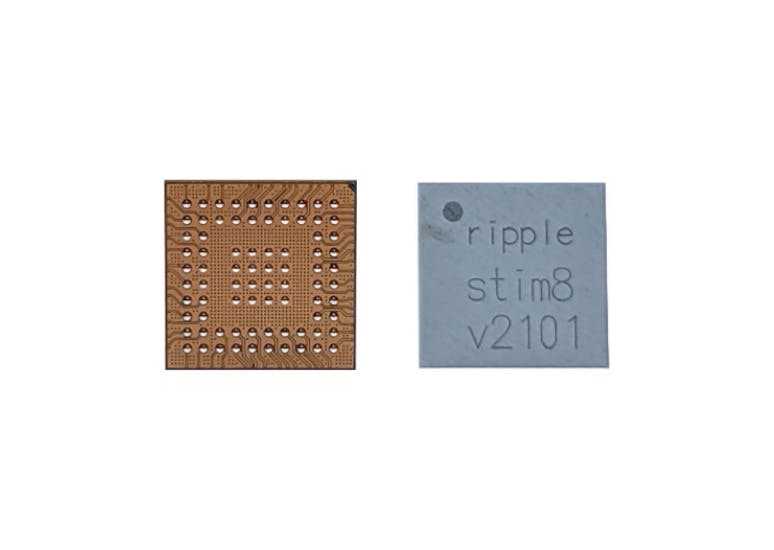
Component
Power & Data Subsystems
IRIS Biomedical specializes in medical applications that require high-performance wireless powering, and high-bandwidth data telemetry capabilities.
Our power-transfer technology supports “RF powered” implants that rely on closely-coupled internal and external electronics, as well as battery-powered implants that require periodic power transfer to charge implantable batteries.
Our high-bandwidth data telemetry is ideally suited for applications that employ continuous closed-loop sensing and stimulation algorithms or require rapidly-changing, externally-driven stimulation.
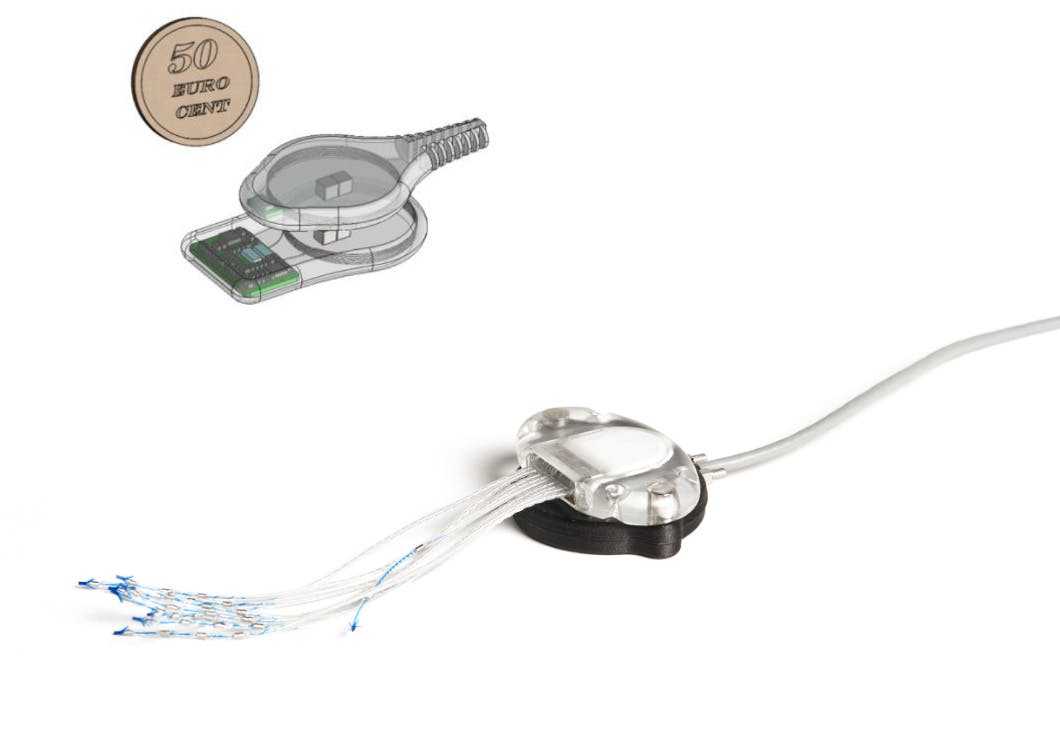
Component
Hermetic Packaging
IRIS Biomedical has experience designing active implantables with both ceramic and titanium enclosures. Our designs utilize high-quality, high-performance components sourced from industry-leading medical component suppliers.
IRIS employs high-density hermetic feedthrough assemblies to achieve high-channel-count sensing and stimulation capabilities while maintaining low overall device footprint, including device thicknesses less than 4mm for implants with 32 channels.
IRIS employs IR and RF transparent ceramic enclosures for applications requiring high data rate telemetry.
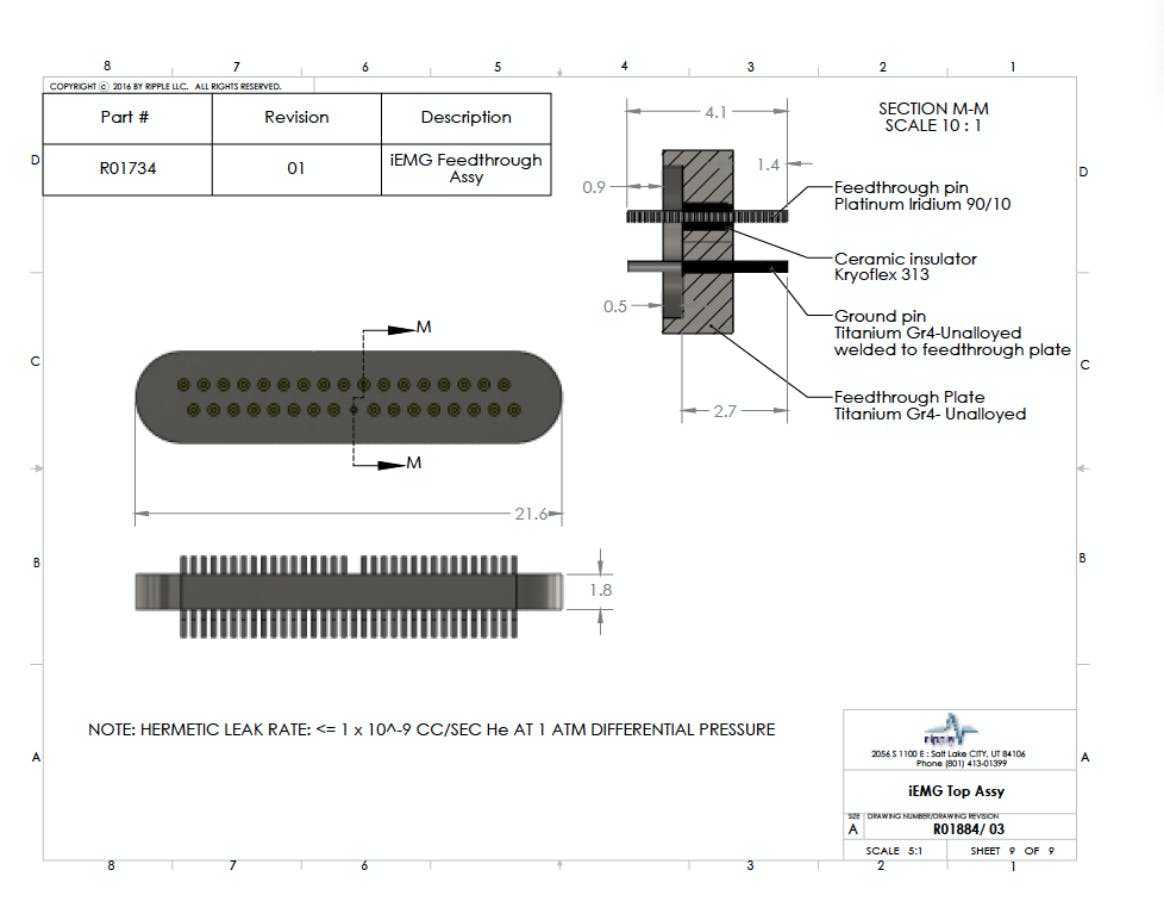
Component
Flex Lead Technology
IRIS Biomedical’s stimulation technologies and stimulation circuit design expertise are the result of over a decade of continuous effort, and multiple generations of product development to create high-performance tools for advanced neural interface applications.
Our stimulation hardware and waveform control engine (including ASIC and control logic) differ significantly from technologies presently available in the clinical neuromodulation market. All of IRIS’s stimulation ASICs provide independent current control (ICC) on every channel. Additionally, waveforms and train patterns on each channel can be programmed at an “atomic” level through very high temporal-resolution control of each channel’s output. This allows the ASIC to be programmed to output any desired waveform and any desired frequency (from DC up to multi-kHz).
Features
- Biocompatible material composition for long-term implantation
- Thin, flexible form-factor to minimize impact on neural tissue
- Customizable geometry to target specific neural anatomy
- Wire-free construction to reduce stiffness and improve durability
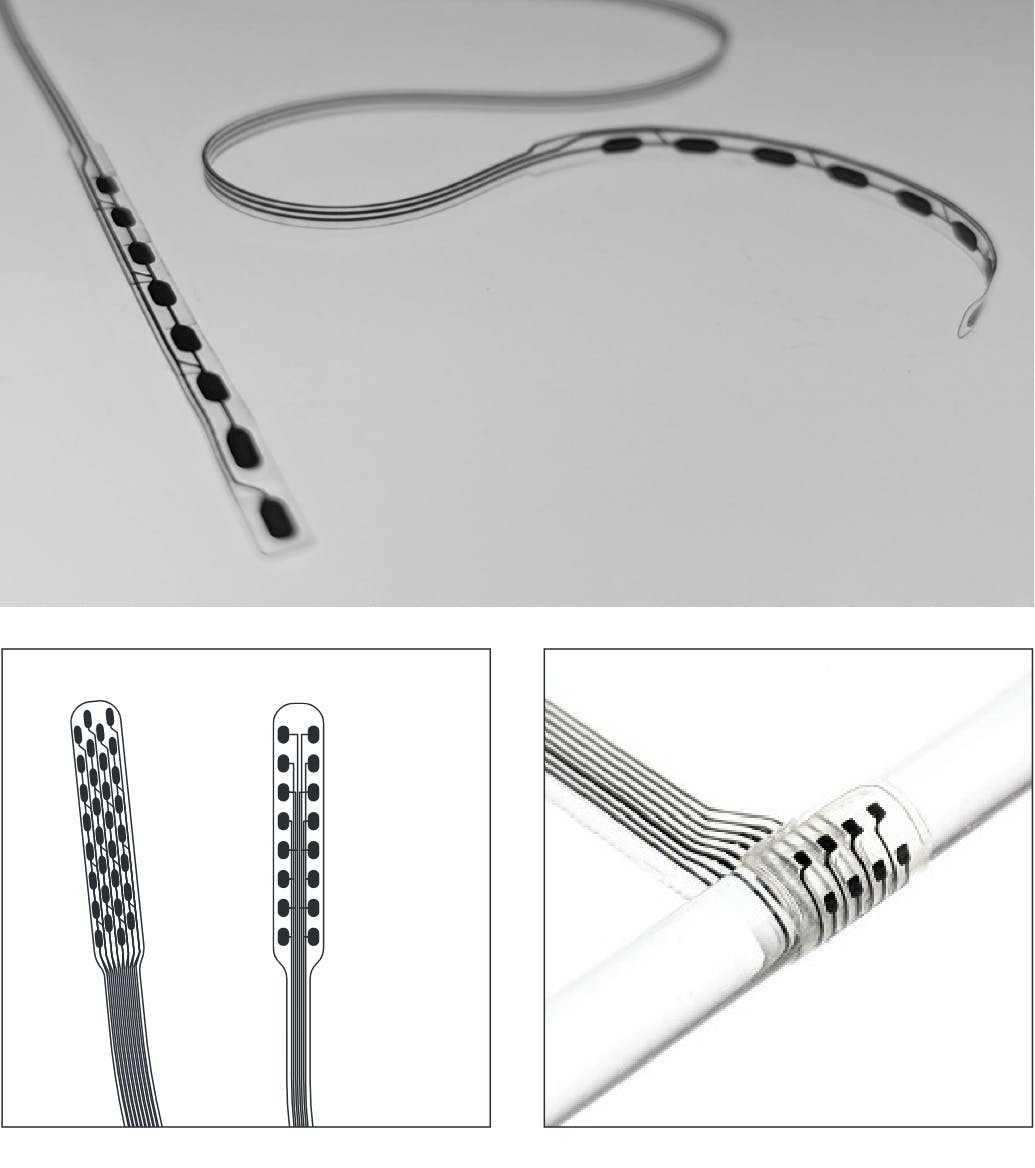
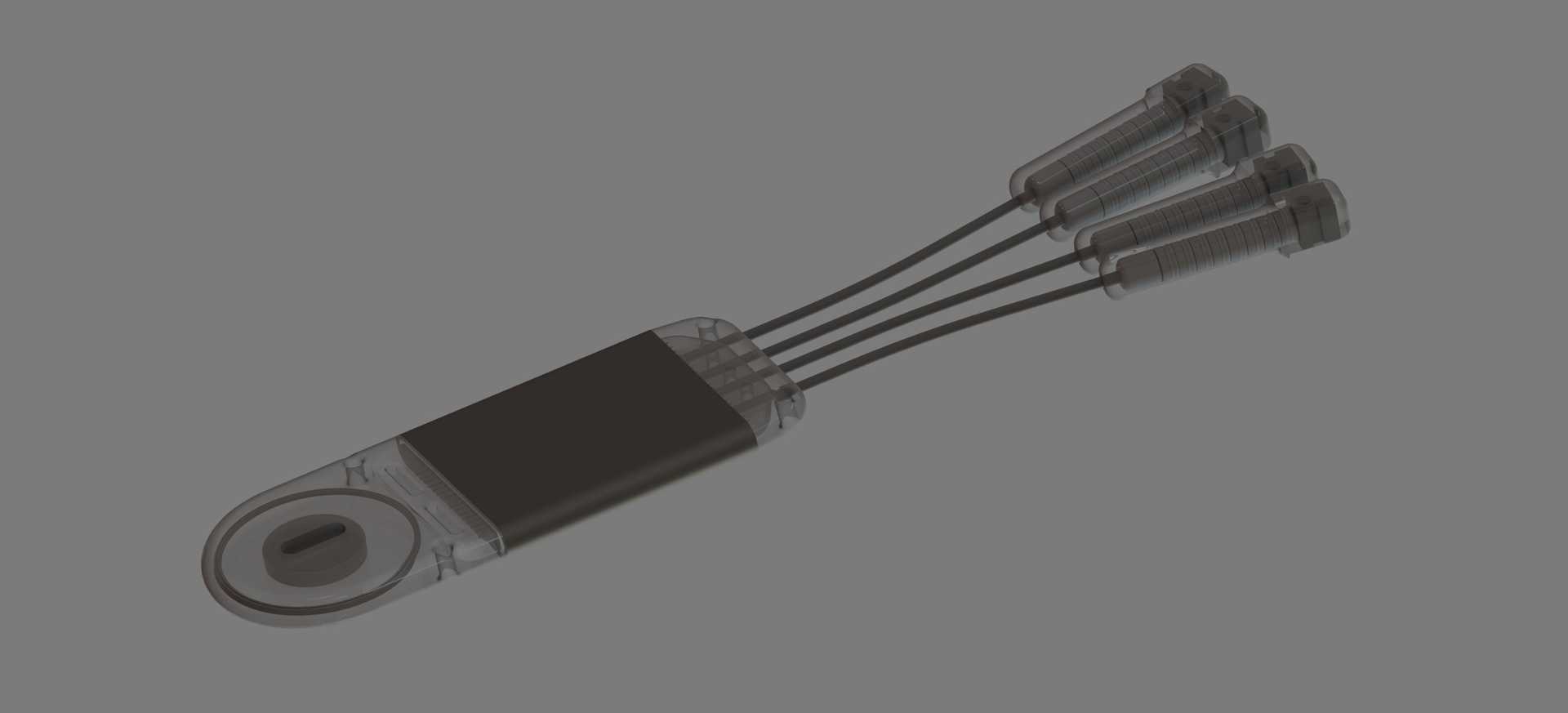
Complete-System Platforms
Platforms
Clinical Investigations
ATHENA
IRIS Biomedical’s latest active implantable, the ATHENA, is designed to provide clinical researchers with a highly-configurable platform to support investigation into the latest emerging closed-loop neuromodulation therapies.
The ATHENA combines IRIS Biomedical’s latest high-performance, programmable stimulation ASIC with its industry-leading sensing technology, for measuring evoked neural signals (ECAPs), EEG, ECoG or EMG to create a research platform with unmatched capabilities. The ATHENA system offers modular processing capabilities to enable rapid development and evaluation of novel stimulation control algorithms.
FEATURES
- Titanium enclosure for long-term (10+ years) implantation.
- RF powered to reduce size while increasing longevity and safety.
- RF and Reflected Impedance (RI) options for data telemetry.
- Compatible with various clinical leads/electrodes to support a wide range of neural interface needs.
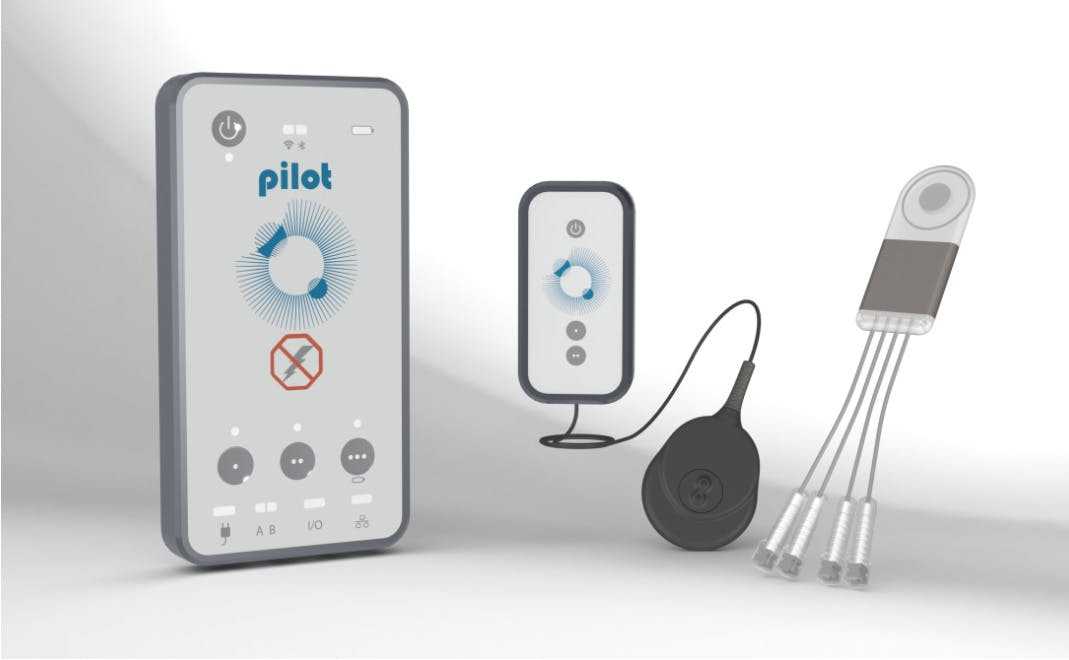
Pilot Handheld
The Pilot is a portable neurophysiology processing hub that supports up to 256 concurrent channels of neural sensing input and stimulation output, as well as an array of auxiliary I/O channels. It is compatible with all of IRIS’ implantable component technologies enabling it to be configured for a wide range of bio-amplifying and bio-stimulating functions.
The device has button-based, and IP network-based, interfaces for controlling device function, as well as LEDs, to indicate device status. It also has integrated Wi-Fi, Ethernet, Bluetooth, Battery, Storage, and an onboard processor for advanced digital signal processing
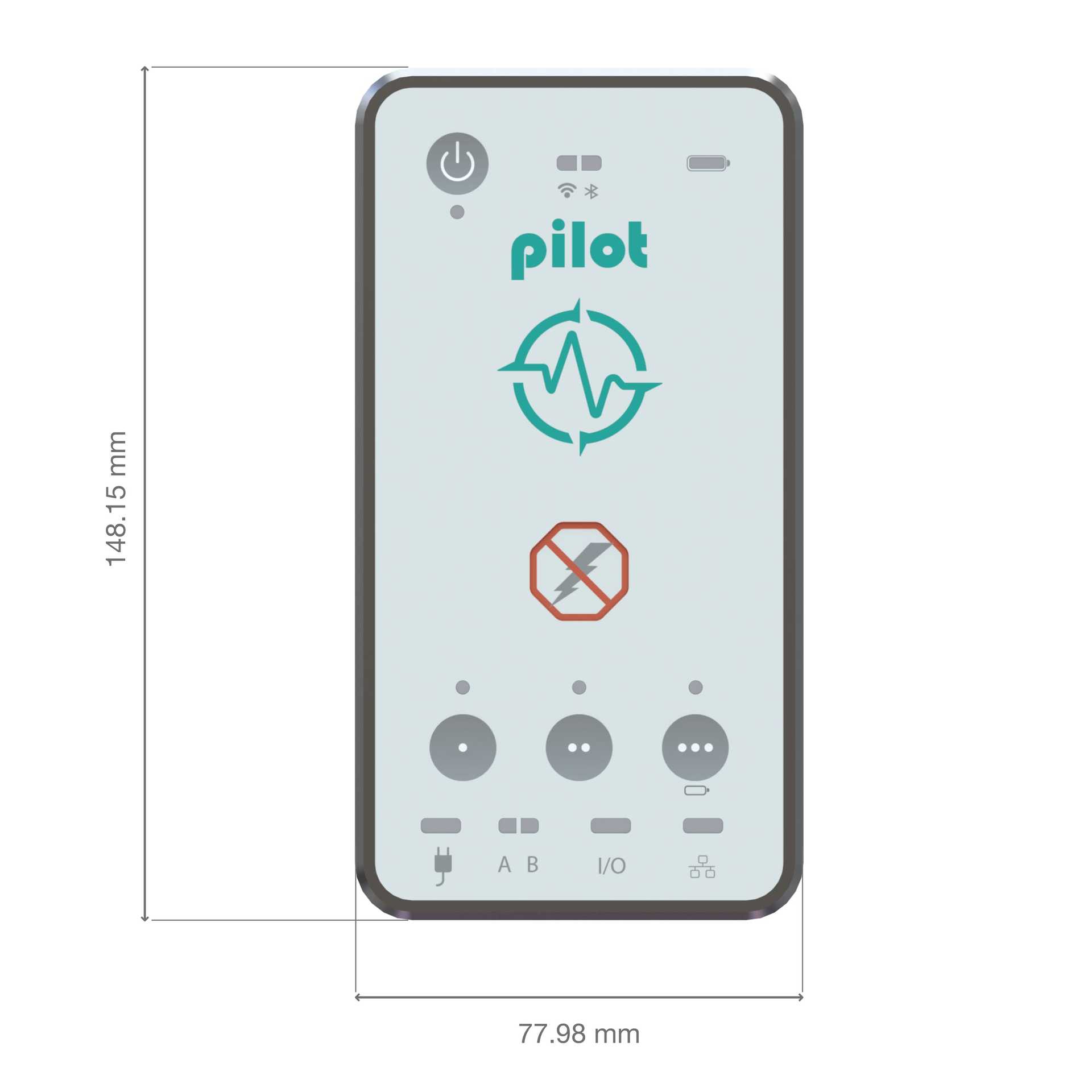
Platforms
Pre-Clinical Research
IRIS Biomedical offers several models of our portable data processing platform designed to support clinical (and pre-clinical) investigations into neural-interface and neuromodulation applications.
Designed around a central signal processing and stimulation control hub, the platform employs a modular architecture and includes sensing and stimulation modules that can be combined in a variety of ways to achieve specific, targeted, multi-modal function.
The system includes graphical data visualization tools and real-time MATLAB and Python APIs that provide flexibility to rapidly develop and test a range of real-time closed-loop algorithms.
Our portable data processing platform has been used in multiple FDA-approved clinical investigational studies at leading hospitals and neural interface research universities around the world.
